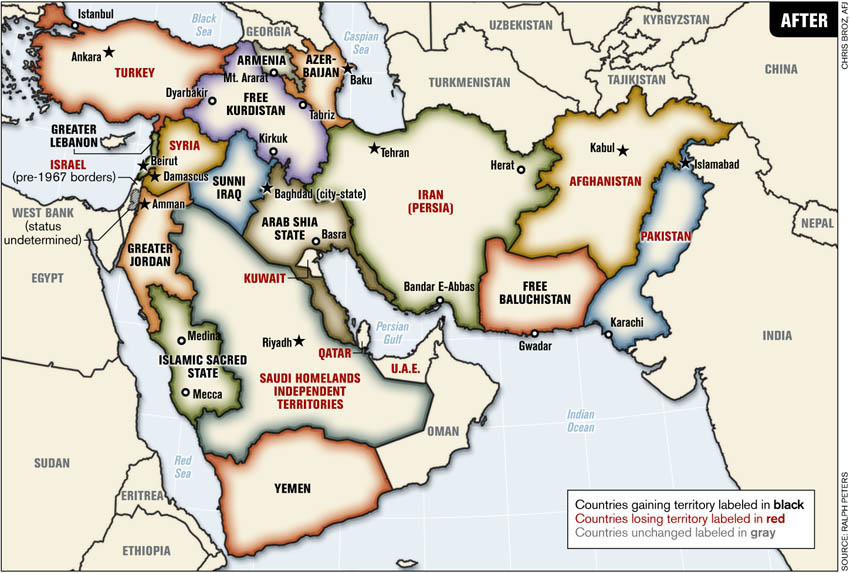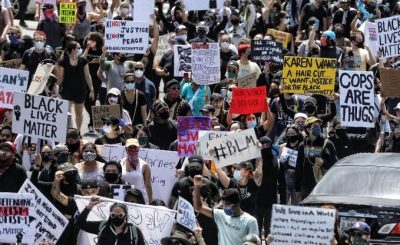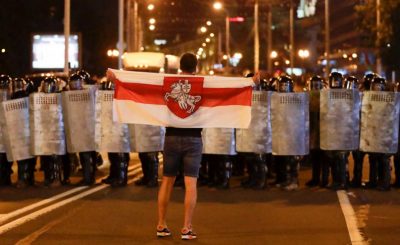Imperialism has been present for centuries in the Middle East. The current borders of the Middle East were drawn by imperialism and the governments of several countries were brought to power by the imperialists or were supported by them.
The preparations by the USA for an attack on Iraq, which are a new example of imperialist aggression, have again put the Middle East at the centre of world attention. They are discussing “who is in the right”. This discussion is highly desirable. It is clear that it is not about “opening or not opening the palaces of Saddam to inspection”. Everyone knows that this is an invented pretext and a flat lie to cover the aggression and tyranny of the USA. When the hundreds of years of existence of imperialism in the Middle East are considered, one can see that the interventions by imperialism in the Middle East have never once been for the benefit of the peoples living there. Every intervention, every border violation by imperialism meant blood, tears, suffering and poverty for the peoples of the Middle East. The US attack on Iraq is directed simultaneously at all the peoples of the Middle East. The importance of the Middle East and the USA’s imperialist plans for the region lie behind the US imperialist attack.
This kind of aggression has been experienced by the peoples of the Middle East throughout their history. The riches of the region’s natural resources have been exciting the greed of imperialism for a long time, and made it a target of imperialist attacks for centuries.
POLICIES OF “DIVIDE AND RULE” IN THE MIDDLE EAST
The Middle East, one of the oldest sites of civilisation in the world, have been a homeland for different peoples for centuries and became a centre for many nationalities and religions. When Islam arose in this area and spread, various wars for supremacy were fought out under the veil of religion.
Wars are a factor which have particularly influenced the peoples who live in the Middle East. In the seventh century, the Islamic Arabs conquered Syria (at that time the area comprised what is now Lebanon and Palestine as well as what is now called Syria). Later Islamic tribes settled in the area in order to beat off the attacks by Byzantium.
However, the Christians who once lived in the region and who had been driven from their homeland, settled in the mountainous regions of Lebanon. The Crusades resulted in various religious groups migrating.
Then the Middle East was conquered by the Ottoman Turks. The first Ottoman Sultan Selim forced the Mamelukes (the rulers of Syria and Egypt) to surrender in 1516 in Syria, and then he imposed taxes on them as well.
Ottoman rule lasted a long time. However, they did not possess the economic and political power to keep power in their hands forever. Especially during their period of decline, their control slipped. German imperialism stepped in in their place. At the start of this century German imperialism took steps to derive advantage from the Middle East’s enormous economic potential and strategic importance. So it began to move closer to the Ottomans and to conquer spheres of influence in the Middle East. However the Germans were not alone in being interested in the region.
The French and English imperialists made plans to drive the Ottoman Empire, which they called the “sick man of Europe”, out of the region. They fanned the discontent the peoples living there felt with the Ottoman Empire, and presented themselves as supporters of “independence” for the peoples of the Middle East.
With the Sykes-Picot agreement in 1916, the French and English imperialists divided the Middle East among themselves and decided which areas would be in their spheres of influence.
With the defeat of German imperialism and the collapse of the Ottoman Empire after the first imperialist war of partition, the domination of the Middle East by French and British imperialism took firm hold.
During the second war, German fascism, in the conflict among the imperialists for markets, turned its eyes towards various regions, among them the Middle East. German imperialism, which did not want to leave the region to the French and the English, sent armoured units towards Egypt.
After the second imperialist war of partition, the imperialists mobilised in order to redraw the geopolitical and political map of the Middle East. The puppet states they erected and their collaborationist leaderships became imperialism’s closest allies.
Through these puppet regimes the imperialists were seeking to safeguard their long-term interests in the region and develop the conditions to stay there permanently.
With policies of “divide and rule”, they triggered off wars which over decades pushed the peoples into massacring each other. Borders were divided in such a way as to cause problems, and peoples who were actually in conflict with imperialism engaged in artificially induced conflict with each other.
The puppet regimes, beaten, weak, powerless and dependent, had completely surrendered to the imperialists.
Several small states like Jordan, Lebanon, Qatar, Kuwait and Bahrain arose as a result of imperialism’s policy of destruction and division.
The imperialists also had Israel created at this point, in order to have a trustworthy and firm base in the region. The differences among the nationalities and religions of the peoples, who had lived within the same geographical borders for centuries, had shared the same fate and also had much in common, were exploited to prevent them forming a common front and developing their brotherhood and sisterhood.
This was done to prevent the Turks, Kurds, Arabs, Palestinians, Iranians and Druze, in short, all the peoples of the Middle East, from struggling against imperialism and its local collaborators.
Nevertheless, there were also important developments which frustrated the plans of the imperialists and dealt them blows.
On the one hand, a “progressive” bloc was formed with support from the Soviet Union, on the other hand the USA, which arrogated to itself the role of world policeman, began to hunger after the markets of English and French imperialism in the Middle East, since these powers had lost strength following the second imperialist war of partition, and it started to become established in the region. From this point onwards, events in the region were heavily influenced by the policies and the attacks of the USA.
THE MIDDLE EAST AND IMPERIALIST LOOTING
The Middle East is no ordinary market in the view of imperialism.
The reason for this special importance is its geopolitical and strategic location in the world and its possession of rich deposits of oil.
It is located at the meeting point of three continents. The most important communication and travel networks run through the area. Taken together, these advantages – its geographic importance, its wealth in natural resources, especially oil, its economic potential and different possibilities, it is a significant and indeed indispensible area for imperialism.
So the region’s Eastern Mediterranean was the cradle of some of the most important civilisations in history, and the most significant religions arose in this area. The Silk Road and the connection between India and Europe triggered off wars between empires which wanted these routes under their control.
A great part of the world’s oil reserves, of crucial importance for all imperialists, are found in this region. Japan obtains 75% of its oil consumption from the Middle East, while Europe obtains about half and the USA 20% of its oil from the same source. And the strategically important Suez Canal,which is an important watercourse and shortcut for travel and commerce by sea between Europe and the Far East, is located here.
At the same time the Middle East is an indispensible arms market in which the imperialist arms monopolies are influential. Those who incite and arm the peoples against each other keep themselves alive with this market.
When the prestige of socialism was high, several liberation movements and progressive Arab leaderships in the Middle East were influenced by it. They had friendly relations with the Soviet Union. This annoyed the imperialists and they nourished and protected the reactionary Arab regimes in the Middle East in the name of “preventing the expansion of the Soviet Union into warm-water regions”.
In short, the Middle East, with all these characteristics, with its structures which are known to be underdeveloped and its neocolonial countries, is an important market for imperialist monopolies which struggle with each other to acquire a bigger share.
THE EXISTENCE OF THE USA IN THE MIDDLE EAST MEANS PLUNDER, EXPLOITATION AND ATTACKS
While new power relationships were forming after the second war of partition, nothing changed from the point of view of the peoples of the Middle East. All that changed was that the USA’s sphere of influence grew in the Middle East, as across the world.
The USA emerged as a winner from the second war of partition and made itself the world policeman. So it erected and established its mastery over the Middle East, with the Zionist state of Israel playing an important role in this.
The Zionist state of Israel, whose founding was prepared by English imperialism and carried out in May 1948, later became an important and hard-hitting stronghold of the USA in conflicts with the peoples of the Middle East.
Israel tried everything, military occupation included, to have its existence recognised, an existence which came about through the support of imperialism. Israel was a bulwark for imperialism’s application of terror to suppress the struggles of the peoples living there and to inflict further exploitation. In return, Israel was one of the countries which received the most economic and military aid from imperialism.
In the period after the second war of partition, the development of socialism into a powerful centre was a threat to the interests of imperialism. About a third of the world was outside the sphere of influence and exploitation of imperialism. And the development of national and social liberation movements in the course of imperialism’s third period of crisis also threatened its position.
As a result of their fears, the imperialist countries, above all the USA, began an anti-communist, anti-Soviet campaign which they called the “cold war”. Allegedly to “protect the peoples from communism” they carried out inconceivable attacks and massacres. The Eisenhower Doctrine, special treaties with various countries in the Middle East and the proliferation of military bases and listening post. The Treaty of Baghdad, known as CENTO, was a consequence of this policy.
Imperialism carried out all its attacks, putsches and military occupations in the Middle East in the name of “fighting communism”. It chose this path to conceal its plundering, devastation and exploitation.
The first action of Mossadeq, who came to power in Iran at the start of the 1950s, was to nationalise the oil industry which was being exploited by the imperialists. Mossadeq, who put the national interests of Iran first, was for this reason overthrown by a coup of CIA origin.
Egypt in 1956 supplied another example. Nasser, who followed a petit-bourgeois Arab nationalist line and adopted radical anti-imperialist attitudes, was also not congenial to imperialism. The nationalisation of the Suez Canal, which was under the control of English and French imperialists, was used as a pretext by imperialism to launch an attack, in which Israel was made use of.
From then on imperialism in the Middle East followed a policy of open aggression. After Egypt, Lebanon was a target. US imperialism sent its Marines to Lebanon to support the collaborating Falangists against the country’s progressives. In this attack on Lebanon, the USA received particular support from the Menderes government in Turkey. At the same time the English in Cyprus deployed paratroopers in Jordan.
From the point of view of the imperialists in 1960-70, the chief danger came from radical, petit-bourgeois nationalist currents, which in Egypt were led by Nasser and in Iraq by the Ba’athists. Another danger was the armed liberation movement in Palestine which came onto the agenda in 1965 with its first armed and organised action.
Moreover, in this period the USA gave Israel the green light for attacks on the Arab peoples and anti-imperialist progressive forces. In 1967 Israel occupied more territory belonging to Syria and Egypt.
The “non-aligned” leaderships of countries like Jordan and Egypt separated them from the Arab world. They formed alliances aimed at weakening the Arab world by signing a treaty with Israel. After 1970 the USA and Israel continued its attacks in the Middle East.
In 1991 the USA attacked Iraq under the pretext that it had occupied Kuwait. Thousands of their soldiers and their enormous war machine in the Middle East together murdered thousands of Iraq.
The USA wanted to intimidate the peoples of the Middle East and the world with this attack and aimed to achieve complete victory. So this attack was not aimed solely at Iraq. It was aimed at all the peoples of the Middle East, Arabs, Iranians, Kurds and Turks.
The USA which wants to create a “New World Order” with a remodeled Middle East, is threatening progressive countries and organisations in the region.
Actually imperialism has shown the world with its attack how barbaric it can be, what destructive and deadly weapons it can deploy. It chased Iraq out of Kuwait and put a significant area under its own control. But that was all that happened. Imperialism’s other aims in the Middle East were not realised.
It has managed to influence various nationalist forces to some degree or other but it could not make the people of Iraq or the Middle East submit. The 1991 attack has a place in history as one of the bloodiest pages in imperialism’s file of crimes in the Middle East.
Now imperialism is adding new pages to its crime file.
Imperialism will not be able to achieve its aims. This aggression too will be added to its crime file. Because of this file, the peoples of the Middle East will one day demand a reckoning from it.
The huge military power of imperialism will not protect it from having to sit in the dock in the court of the peoples’ justice.
Source: Haklıyız Kazanacağız / We Are Right! We Will Win! / ; People`s Liberation Publications; 1990.




